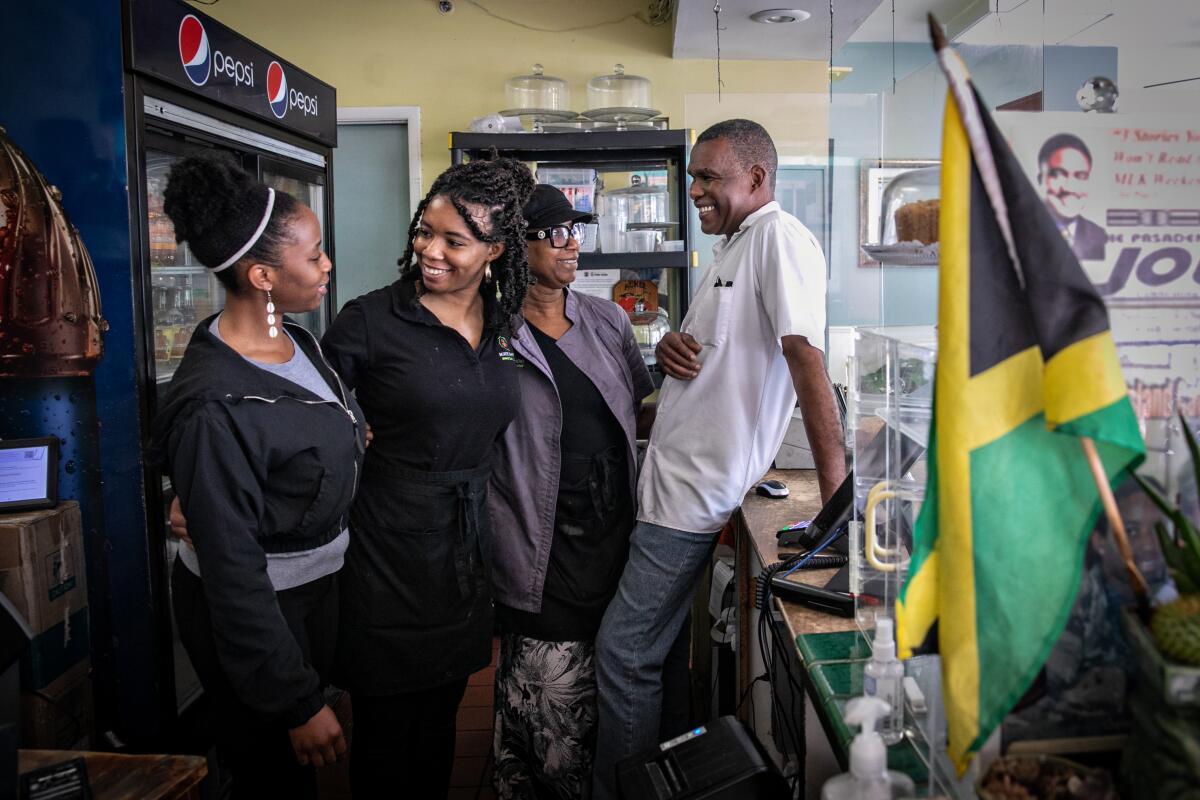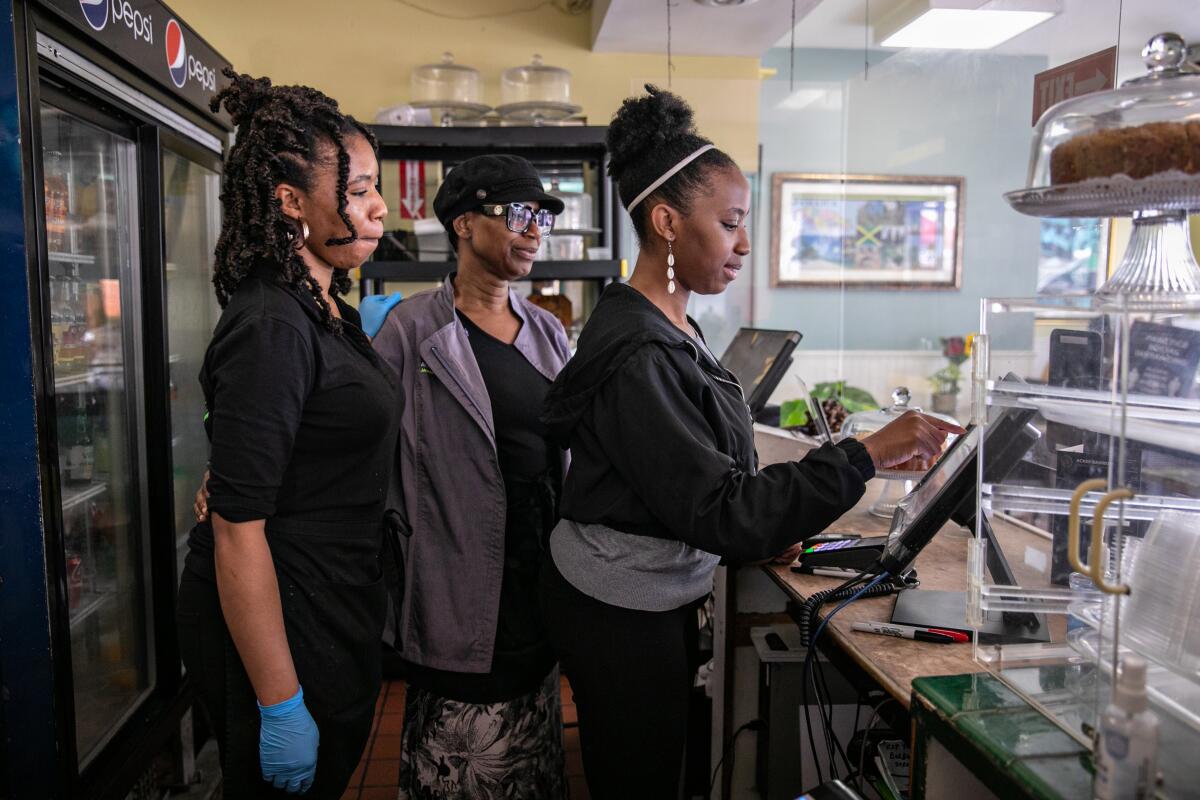Question of reparations raises skepticism and hope among Black L.A. residents

- Share via
Carolyn Peters grew up during a time when Compton was a mostly white middle-class suburb, and she was part of her generation’s vanguard, as one of the first Black students to integrate the city’s Roosevelt Middle School. Their reception was cold and often cruel.
“There were teachers that had problems with Black children there. And we met resistance not only from other children but from their parents,” Peters said, recalling that era almost 60 years ago.
Teachers insisted that Black students use salutations like “sir” or “ma’am,” but allowed white students to reply to their questions with a simple “yes” or “no.” In Peters’ opinion, educators appeared to prefer working with white children. She spent 38 years as a teacher, trying to rectify that.
In town, Black women had to wear dresses or face persecution, Peters remembers. And she and her peers were not allowed to sit anywhere but upstairs while watching movies at the Compton theater.
Still, Peters is proud of the life she built as a homeowner in South Los Angeles — and acutely aware that she has never had a level playing field.
And now, as California readies to finalize a discussion on reparations that could shape the lives of millions in the Golden State, Peters and other Black Angelenos are skeptical they will ever see the restitution they feel is deserved.
After almost two years of meetings, California’s Reparations Task Force decided last month to recommend that the state issue a formal apology for the pervasive harms of slavery and discrimination and potentially provide billions of dollars in cash payments in a historic effort to make amends.
The group’s final report, due to the state Legislature by July 1, will act as a guide for lawmakers and Gov. Gavin Newsom, who will determine if the harms of slavery and lasting discrimination are worthy of reparations.
The current task force report offers reparations only to Californians who are descendants of enslaved Americans and calculates their monetary losses in three categories of community harms: health disparities, African American mass incarceration and over-policing, and housing discrimination.
And while the prospect of reparations has been the subject of much public discourse, the process is only vaguely understood in many of the communities that stand to benefit the most.
But that hasn’t stopped people from speculating or drawing up wish lists.
Critics question whether the task force’s proposed recommendations are sufficient to address systemic issues in the Black community that remain prevalent today. Supporters, on the other hand, contend that billions of dollars in direct payments and a formal apology are the most effective ways to atone for generations of discrimination that have shaped the Black experience in Southern California.
Most legislators have not yet tipped their hand on where they stand, but the debate remains one of the hottest topics in town, particularly in Los Angeles communities such as Crenshaw, Leimert Park and Inglewood — the heart of Black L.A.
There is no shortage of suggestions.
Direct payments are only one method the state could use to support the descendants of slaves. Peters would like to see apartments become affordable on minimum wage, more resources for those who rely on meager government benefits and funding to address the ravages of recent history.
Peters remembers the Black-owned banks, restaurants and storefronts that were forced to close in the wake of the 1992 civil unrest, which reshaped the character of her neighborhood in South Los Angeles.
“I really think if we’re going to talk about helping people with reparations, we have to think about the riots and the lot of Black businesses that lost their business because they weren’t able to get the loans to make repairs,” Peters said. “How much better off would we be if we had that money to stand on?”
And she hopes that somewhere in the big-picture deliberations, the lens is turned on individual needs of Black people who are suffering.
The item at the top of Peters’ personal reparations list is providing a way to fix her home’s old windows and leaking roof, so her knees won’t ache as much in the cold.
“I think the intention of it, whatever it looks like,” Peters said, “the goal should be to help people live a little bit easier.”
There’s no telling if the nine-member committee’s two-year process will pan out as anticipated. Two local lawmakers who sit on the task force, state Sen. Steven Bradford (D-Gardena) and Assemblyman Reginald Jones-Sawyer (D-Los Angeles), are expected to lead the efforts to convince their fellow lawmakers to provide reparations.
But the topic is as politically incendiary as it is expensive, with a price tag potentially in the billions.
Overlooking speeding cars from her motorized wheelchair on a sunny Thursday afternoon, Beverly Johnson ticked off problems that need fixing in the area around her senior housing complex, near Florence and Normandie avenues. She’s worried about an uptick in crime, wall-to-wall graffiti and the ever-present noise of police helicopters.
The 68-year-old Angeleno joked that Black residents should receive “40 acres and a mule” for all they’ve endured, a saying that dates back more than 150 years to a promise made — and broken — to aid enslaved African Americans on the verge of emancipation.
“It’s what was promised,” Johnson said, implying that reparations may meet that same fate.
“I don’t think we’ll ever get money or land. Heck, I don’t know if any changes will take place,” she said, reflecting on the state’s looming budget crisis and the lack of land to house struggling veterans.
Her reparations wish list includes helping homeless individuals find a way off the streets, particularly those who suffered through the war on drugs.
And at the very least, Johnson would like reparations to include a monthly stipend to assist with rent payments and the high cost of living in this sprawling city.
Others who were interviewed by The Times in the Los Angeles area acknowledged they’ve pondered the possibility of restitution in recent months. Many, however, were unaware of the specifics under consideration and instead repeated rumors they’d heard from relatives or friends that payments would range from hundreds of thousands to millions of dollars for each Black Californian.
Others were concerned that without guidance that teaches people how to protect and grow the assets they’d receive as reparations, the money may be squandered or misspent. That sentiment was echoed by a trio of men in Inglewood, who pointed to nearby luxury vehicles to exemplify how much of the reparations windfall might be spent.
One of those vehicles, a Mercedes-Benz, was driven out of the fast-food parking lot by Randy Mitchell, who manages Preferred Chauffeured Limousines.
Mitchell arrived in Los Angeles from Louisiana in 1975 at age 16 with dreams of being a California Highway Patrol officer. He avoided gang life and other risky situations, but finding a path to a career wasn’t as easy as he imagined when he left the South for more opportunities.
“There was neglect, abuse and discrimination everywhere,” Mitchell said. “Shoot, we are still going through it.”
His friend, L.A. native Terry Harmon, shared Mitchell’s skepticism about the pace of change. They both doubt they will see financial benefits anytime soon. But the options being considered are “better than what we’ve been getting,” Harmon said. “I’d still want the check.
“But how much money is worth the cost of slavery?” he wondered.
The question hung in the air like the smell of fried food and blaring sirens in the distance.
In Hyde Park, Jermaine Stewart and his wife, Heather Daly, seemed more upbeat about the possibility of reparations.
Stewart recalled growing up in the Rollin’ 60s gang territory, attempting to navigate a landscape of drugs, poverty and disease.
“I seen my people struggle,” he said, which is why he wants the state to invest in resources like youth centers that help children acquire the skills to thrive in everyday life.
He has friends and family who wound up living on Skid Row, so Stewart hopes government officials are sincere about providing something that can improve lives for decades to come.
The best-case scenario, Stewart dreams, is that kids find a career path and establish their own businesses.
“It could be something profitable and something to stand on,” Stewart said, “so we can be well off and have it become a generational thing. I feel really strong about them pushing that.”

Nearby at her family’s restaurant Ackee Bamboo Jamaican Cuisine in Leimert Park, Melissa Beckford echoed the wish for Black residents to build a foundation for a better future — even though reparations are off limits for Beckford’s family because her parents emigrated here from Jamaica in their teens.
They realized their dream of owning a restaurant, but their path to success wasn’t easy. Beckford, busy busing tables and taking orders at the Leimert Park storefront this week, was surprised to learn that her family would not qualify for reparations under the recommendations put forth by California’s task force.
The state will only compensate Californians who can directly trace their lineage to slavery in the United States or those whose ancestors immigrated before 1900.
The decision excludes families like Beckford’s, but the task force thought a plan backed by genealogy, instead of just race, had the best chance of being upheld in case of a legal challenge.
Some on the task force argued that reparations should include all Black people who suffer from systemic racism. But their proposal lost by one vote.
To Beckford, that outcome represents opportunities missed. If reparations are a way to repair “the brokenness of local communities,” they ought to go to all who have suffered and not yet recovered from generations of discrimination, she insisted.
If it’s so important for everyone to be on the same level in the name of equality, “which is something that this nation talks about,” Beckford said, “they should want us to be on the same footing.”
More to Read
Sign up for Essential California
The most important California stories and recommendations in your inbox every morning.
You may occasionally receive promotional content from the Los Angeles Times.














